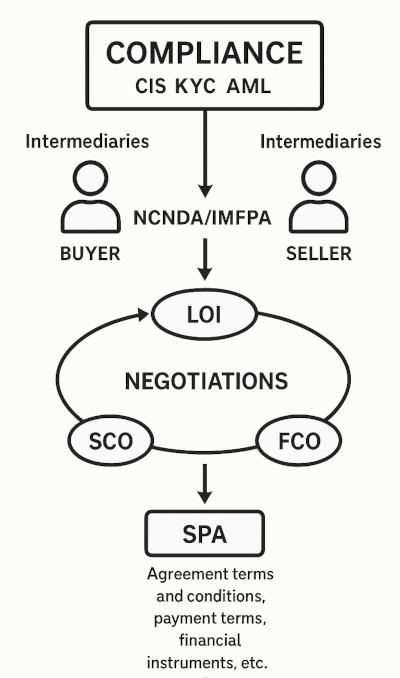
International trade involves complex processes designed to ensure secure and efficient transactions between buyers and sellers. A clear understanding of the sequence and documentation involved is crucial for a successful transaction.
Initial Agreements: NCNDA and IMFPA
Transactions typically begin with a Non-Circumvention, Non-Disclosure Agreement (NCNDA) and an Irrevocable Master Fee Protection Agreement (IMFPA). These documents protect parties from circumvention, safeguard confidential information, and ensure commission agreements are clearly documented and legally binding.
Expression of Interest: LOI
Once initial agreements are in place, the buyer formally demonstrates interest by issuing a Letter of Intent (LOI). This document outlines preliminary details such as the type of goods, quantity, quality, and desired terms.
Offer and Negotiation: SCO and FCO
The seller responds with a Soft Corporate Offer (SCO), specifying initial terms and pricing. Further negotiations may lead the seller to issue a Full Corporate Offer (FCO), containing refined details and firm pricing conditions.
Formalizing the Transaction: SPA
After successful negotiations, parties execute a Sales and Purchase Agreement (SPA). This binding document comprehensively details the terms, including specifications of the goods, pricing, delivery schedules, payment terms, and the involvement of financial instruments such as Letters of Credit (LC), Standby Letters of Credit (SBLC), or Bank Guarantees (BG).
Compliance Essentials: CIS, KYC, AML
Integral to international trade are strict compliance measures, including Customer Information Sheets (CIS), Know Your Customer (KYC), and Anti-Money Laundering (AML) procedures. These ensure parties’ legitimacy, reduce risks, and comply with international financial regulations. CIS captures detailed party information, while KYC and AML protocols verify identities, financial histories, and transactional legitimacy.
Understanding and properly executing these processes and compliance steps ensures smooth and legally sound international trade transactions.
We use cookies to give you the best online experience. By agreeing you accept the use of cookies in accordance with our cookie policy.